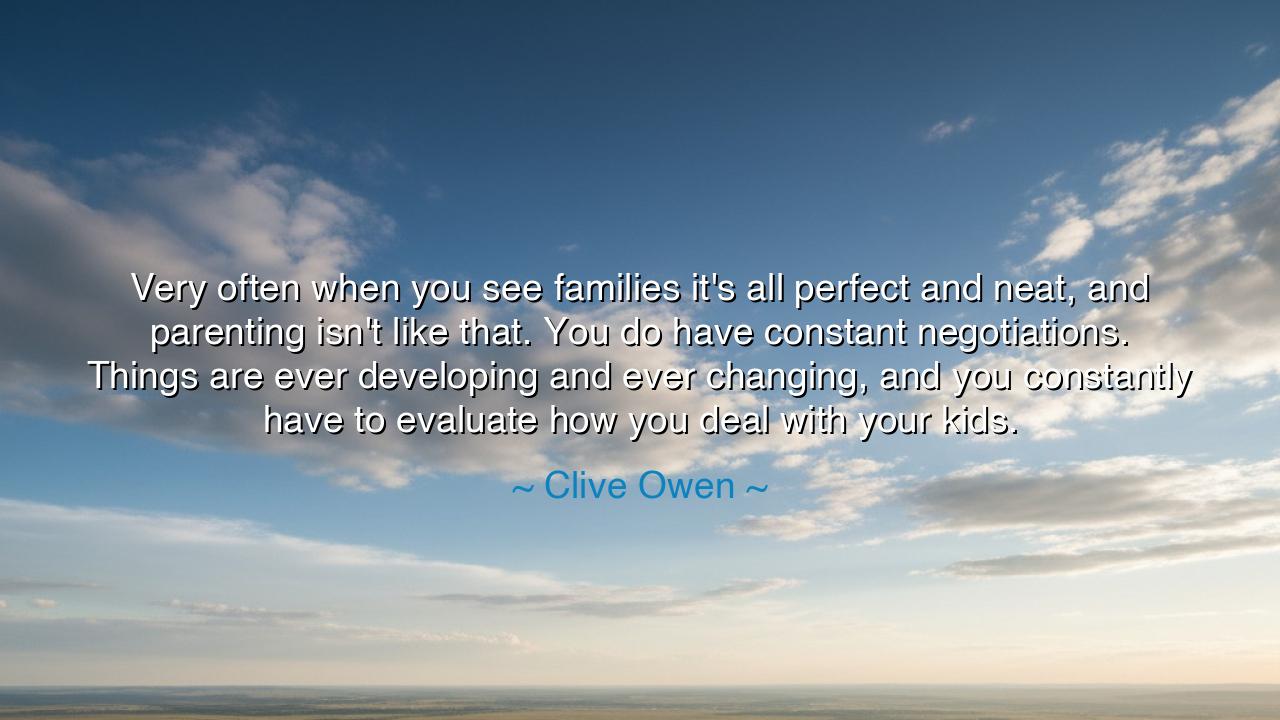
Very often when you see families it's all perfect and neat, and
Very often when you see families it's all perfect and neat, and parenting isn't like that. You do have constant negotiations. Things are ever developing and ever changing, and you constantly have to evaluate how you deal with your kids.






Hearken, O seekers of wisdom, to the reflection of Clive Owen, who unveils the hidden truths of parenting beneath the veil of appearances. He observes that the families often displayed to the world seem perfect and neat, yet the reality of raising children is far more intricate and demanding. In his insight lies an ancient truth: parenting is not a static endeavor, but a dynamic and evolving journey, requiring vigilance, reflection, and adaptability. The household is a living organism, ever changing, and the guardian must navigate it with both courage and discernment.
The origin of this wisdom lies in the perennial human experience of family life. Across the ages, from the households of Athens to the noble courts of Europe, elders recognized that the raising of children is a task of constant negotiation and adjustment. The ancients spoke of the parent as both guide and student, engaged in an ongoing dialogue with the child, adjusting strategies and responses as the young mind and heart unfold. Owen’s reflection modernizes this understanding, emphasizing the necessity of continual evaluation and attentiveness in the shaping of character and the fostering of virtue.
Consider the life of Abraham Lincoln, who, as a father and guardian, confronted the evolving temperaments and needs of his sons with reflection and care. He understood that the challenges of parenting are not resolved by authority alone, but by patience, observation, and adaptation. Each child required a different approach, a different measure of guidance, echoing Owen’s insight that things are ever developing and ever changing, and that the parent must respond with wisdom and flexibility.
The emotional resonance of Owen’s words is profound. To parent is to enter a world of perpetual negotiation, where the heart and mind are engaged in dialogue with the evolving needs, emotions, and desires of the child. Success is not measured by order or perfection, but by the parent’s ability to attend, respond, and adjust, cultivating an environment where trust, understanding, and growth can flourish. The home becomes a living workshop of moral and emotional education, shaped as much by reflection as by action.
In practical terms, his insight teaches that parenting requires mindfulness and adaptability. One must observe the child attentively, assess the effectiveness of approaches, and remain willing to modify strategies in response to changing circumstances. Historical examples, from Renaissance households to modern educators navigating complex family dynamics, illustrate that growth in both child and parent arises from an iterative process of evaluation and adjustment, rather than rigid adherence to preconceived notions or models of perfection.
Owen’s reflection also carries a heroic dimension: the courage to face the unpredictable, to engage in constant negotiation and recalibration, is itself a mark of moral and emotional fortitude. Parenting demands that one embrace uncertainty, confront failure with resilience, and act with intention even when the path is unclear. In this, the parent models adaptability, responsibility, and reflection—virtues that the child internalizes as enduring guidance for life.
From this understanding arises a practical lesson: embrace parenting as an evolving journey, not a fixed performance. Attend to the child’s needs, reflect upon your responses, and adjust strategies with insight and care. Recognize that no household is ever perfect, and that the measure of success lies in presence, discernment, and thoughtful negotiation, rather than in appearances or rigid control.
Thus, the teaching of Clive Owen endures: parenting is a dynamic, evolving endeavor of constant negotiation and evaluation. Let all who bear this sacred responsibility approach it with patience, reflection, and adaptability. In doing so, they honor the truth that the raising of life is an ever-unfolding journey, demanding vigilance, courage, and love, and in this process, they cultivate resilience, wisdom, and virtue in both child and parent alike.






AAdministratorAdministrator
Welcome, honored guests. Please leave a comment, we will respond soon